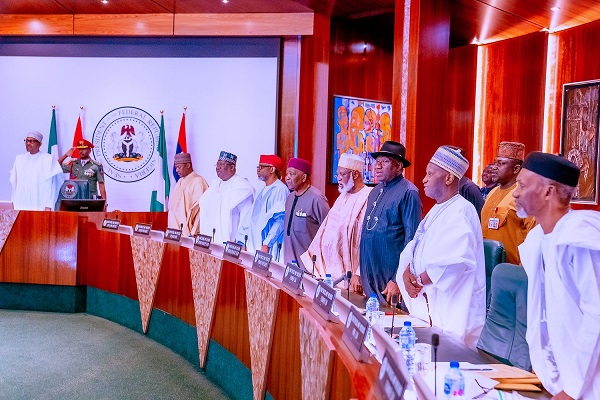The National Council of State has tasked the Central Bank of Nigeria (CBN) to act quickly to stop the shortage of currency across the country, just as it backed the Federal Government’s cashless policy.
To lessen the pain of Nigerians, CBN Governor Godwin Emefiele was asked to either issue new naira notes or reissue old ones. This is the consensus at the meeting of the National Council of State, an organ of the Nigerian government with the power to advise the Executive on policy making, which was presided over by President Muhammadu Buhari, on Friday.
The former Nigerian leaders physically present at the Friday hybrid meeting were Yakubu Gowon, Abdulsalami Abubakar and Goodluck Jonathan. Former President Olusegun Obasanjo joined online.
Reporters were informed on the meeting’s conclusions by the Attorney-General of the Federation and Minister of Justice, Abubakar Malami, along with the governors of Taraba and Lagos, Babajide Sanwo-Olu and Darius Ishaku.
The Independent National Electoral Commission (INEC) Chairman, Professor Mahmood Yakubu, and the Inspector-General of Police (IGP), Alkali Baba, both expressed assurances of adequate readiness for the general elections, according to Malami, who revealed the meeting’s final resolutions.
He added that the conclusion was that the CBN should do more to ensure there is circulation of enough cash in the system to lessen the harsh realities following the policy. He said the briefing on the new monetary policy, including the redesigning of some categories of the naira, elicited reactions and opinions.
“So by way of conclusion, the two major resolutions that were driven, arriving from the deliberations of the Council, are one that we are on course as far as election is concerned and we are happy with the level of preparation by INEC and the institutions.
“Two, relating to the naira re-designed policy, the policy stands, but then the Council agreed that there is need for aggressive action on the part of the Central Bank, as it relates to the implementation of the policy by way of ensuring adequate provision being made with regard to the supply of the naira in the system,” he said.


